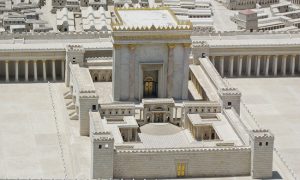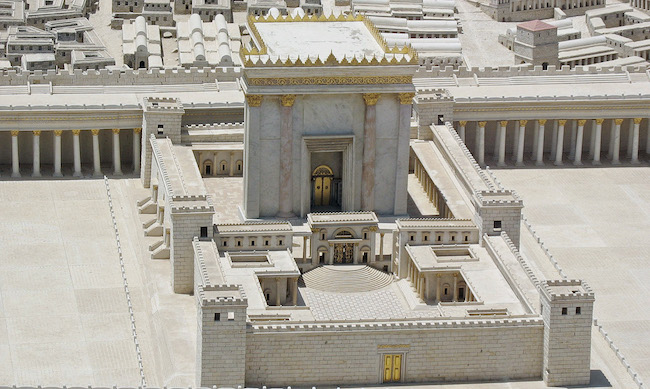
BS”D
Volume 33, No.34
5 Sivan 5779
June 8, 2019
This coming Motza’ei Shabbat, we begin observing the holiday of Shavuot. R’ Yitzchak Arama z”l (Spain; died 1494) asks what he calls a “strong question”: Why does the Torah never mention that Shavuot is the anniversary of the Giving of the Torah? He offers several answers:
First, the Torah cannot logically command us to observe the day of receiving the Torah as a holiday. He explains: There is a viewpoint that there cannot be a commandment to believe in G-d, for there cannot be a commandment unless there is a commander. Before one has accepted G-d as the Commander, any commandment to believe in Him would be pointless. And, after one has accepted Him, a commandment is unnecessary. Similarly, the Torah [which necessarily was written before it was given] cannot contain a commandment to commemorate the Giving of the Torah as a holiday.
Second, accepting the Torah is not an event that happens once a year. Rather, a person is supposed to accept the Torah every day, as we read (Devarim 26:16), “This day, Hashem, your Elokim, commands you to perform these decrees and the statutes, and you shall observe and perform them with all your heart and with all your soul.” Our Sages comment on this verse: Did Hashem give the commandments on this day? Rather, every day a person should view the Torah as if he received it that day.
Nevertheless, R’ Arama notes, the Torah does hint to the date when it was given in the section beginning (Shmot 19:1), “In the third month from the Exodus of Bnei Yisrael from Egypt, on this day, they arrived at the Wilderness of Sinai.” (Akeidat Yitzchak: Sha’ar 67, Part 2)
********
“From twenty years of age and up–everyone who goes out to the legion among Yisrael–you shall count them according to their legions.” (1:3)
Many have wondered at the incredible fact that every single tribe had a population that was divisible by ten. R’ Meir Simcha Hakohen of Dvinsk z”l (died 1926) suggests the following explanation for this phenomenon: As our verse indicates, the purpose of counting the Jewish People was to organize them for war. We learn from several verses in Tanach and from the Talmud Yerushalmi that each brigade in the army of Yisrael had either one hundred men or ten men. Thus, if any tribe had a number of soldiers that was not a multiple of ten, the remaining were not counted because there was no place for them in the army. (Meshech Chochmah)
********
“And with you shall be one Ish / man from each tribe . . .” (1:4)
The word “Ish” commonly denotes a person of spiritual stature. Why? R’ Chaim Yehuda Meir Hager z”l (the Vishever Rebbe in Tel Aviv; died 1968) explains: Our Sages teach, “One hour of Torah and good deeds in this world is worth more than an entire lifetime of Olam Ha’ba.” What is Olam Ha’ba? The Mishnah (end of Masechet Uktzin) teaches, “Hashem is destined to reward each tzaddik with 310 worlds.” Note that the Gematria of “Ish,” referring to the person who engages in Torah and good deed, equals 311, one more than the number of worlds in the Tzaddik’s Olam Ha’ba, thus alluding to the stature of the “Ish.” (Zecher Chaim)
********
Pirkei Avot
“Five acquisitions the Holy One, Blessed Is He, acquired for Himself in His world, and they are: the Torah, one acquisition; heaven and earth, one acquisition; Avraham, one acquisition; Yisrael, one acquisition; the Bet Hamikdash, one acquisition.” (Chapter 6)
R’ Yitzchak Berachiah Mi’Fano z”l (Italy; 1583-1658) asks: From whom did He acquire these five things? Indeed, what does it mean that Hashem acquired something when everything in the world already is His?
He explains: It is G-d’s desire that man have free will so that the righteous will earn reward. (It follows, also, that the wicked earn punishments by misusing their free will.) A strong argument could be made that man’s exercise of his free will should be unlimited, even to the point that he could destroy the world if he chose. However, the five things listed in our Mishnah are so precious to G-d that He took steps to protect them without limiting man’s free will. In this sense, He “acquired” them back from mankind.
How so? [A full explanation of all five “acquisitions” would not fit in the available space, but we present two examples.] R’ Yitzchak Berachiah continues, Hashem knows that the Torah is best off in the hands of the descendants of Avraham, Yitzchak and Yaakov. Still, fairness required Hashem to offer the Torah to all of the nations. What did He do? The Midrash says that, when Hashem offered the Torah to each nation, it asked what is in the Torah. Hashem answered one nation, “Do not steal,” another, “Do not commit adultery,” etc. R’ Yitzchak Berachiah explains that Hashem answered each with a detail that that particular nation would find unpalatable. He did this with the intention of discouraging them. Each of those nations still had the free will to overcome its nature and accept the Torah. The end result, however, was that Hashem “acquired” the Torah back to give to the nation that He knows is the most appropriate recipient.
Another example: Avraham Avinu was born into a family steeped in idol worship. Left alone, Avraham would have been no different than his father Terach–exactly what that wicked generation would have wanted. Hashem did not negate their free will. He did, however, give Avraham an opening, as the prophet says (Yeshayah 41:2–the haftarah for Parashat Lech Lecha), “Who aroused [Avraham] from the east, who would proclaim His righteousness at every footstep?” By “awakening” Avraham, Hashem “acquired” him for His purposes, but Avraham did the rest using his free will. (Chanoch La’na’ar)
********
Tehilim
Siddur Avodat Yisrael cites a custom to recite Psalm 122 on the Shabbat on which Parashat Bemidbar is read. Accordingly, we present here verses from, and commentaries on, that Psalm.
“I rejoiced when they said to me, ‘We are going to the House of Hashem.’ Our feet stood inside your gates, Yerushalayim–Yerushalayim built up, a city knit together.” (Verses 1-3)
The Midrash on this verse observes that there is no generation without its “clowns,” i.e., scoffers and troublemakers. What did they do? They stood outside King David’s window and said, “When will this old man die so that we can go to the house of Hashem?!” Even so, says King David, “I rejoiced when they said to me, ‘We are going to the House of Hashem’.” [Until here from the Midrash]
R’ Yaakov Yisrael Halevi Stern z”l (Maggid /preacher in Kremenets, Volhynia, now Ukraine; died 1799) explains: Hashem had told King David (see Melachim I 8:19), “You shall not build the House yourself; instead, your son who will come from you will build the House for My Name.” Therefore, some people were looking forward to King David’s death so that the Bet Hamikdash could be built.
R’ Stern continues: We read (Divrei Ha’yamim I 22:8), “You have shed much blood and fought great battles; you shall not build a House for My Name.” The Midrash Yalkut Shimoni relates that when King David heard this, he thought that he had sinned by fighting wars. Hashem told him, “No! I view the blood that you spilled to be as sacrificial offerings to Me.” “If so,” asked King David, “why may I not build the Temple?” Hashem answered, “If you build it, it will never be destroyed.” “And let it be so!” replied King David. “If so,” Hashem answered, “then on what will I vent My anger?” [i.e. by destroying the Bet Hamikdash, Hashem vented His anger for our sins so He did not need to destroy the Jewish People.]
In other words, explains R’ Stern, the scoffers in King David’s generation thought that his inability to build the Bet Hamikdash was because he lacked the merit to do so. In fact, the opposite was true–in the merit of the wars that he fought for the Jewish People, King David merited ensuring the continuity of the Jewish People by not building the Temple himself.
The Gemara (Makkot 10a) comments on the verse, “Our feet stood inside your gates, Yerushalayim”: In what merit did our feet stand up in battle? In the merit of the Torah that was studied within your gates, Yerushalayim! [Until here from the Gemara] R’ Stern concludes: King David understood that Torah study cannot lead to a bad result. Therefore, the fact that he spilled blood while winning wars, which he did in the merit of Torah study, could not explain why he was not permitted to build the Temple. There had to be another reason, which Hashem explained was indeed the case. (Shevet M’Yisrael)


